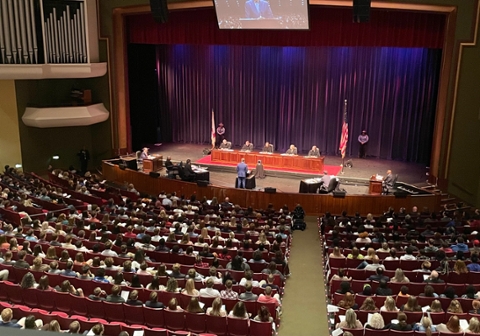Published on November 10, 2022 by Morgan Black

On Thursday, Nov. 10, 2022, Samford University Cumberland School of Law and the Birmingham Bar Foundation partnered to host oral arguments of the state of Alabama’s highest courts. The Supreme Court of Alabama and the Alabama Court of Criminal Appeals brought live-client arguments to Samford’s Wright Center stage for a truly unique educational experience.
In addition to Cumberland School of Law students and faculty, students from the Birmingham metro area’s local high schools were in attendance. Blake Hudson, dean of Cumberland School of Law, Andrew R. Salser, president of the Birmingham Bar Foundation, and Elisabeth French ’97, presiding judge of Alabama’s 10th Judicial Circuit, provided individual welcoming remarks.
Oral arguments for the Alabama Court of Criminal Appeals Case William Darby v. State of Alabama and oral arguments for the Supreme Court of Alabama Case Ex parte Lester Lee Thomas were presented.
“Hosting oral arguments of the state’s highest courts was such an honor,” said Dean Blake Hudson. “Being able to expose our law students to this experience was a privilege, particularly since some members of both courts are Cumberland School of Law graduates. It is important for our students to know that they can be leaders at the highest levels shaping critical areas of law and policy.”
Cumberland School of Law alumni represented on the bench include Judge Richard J. Minor ’93 on the Court of Criminal Appeals and Associate Justices Michael F. Bolin ’73, Greg Shaw ’82 and Brady E. Mendheim ’93 on the Supreme Court of Alabama.
“Seeing our alumni sit on the benches of the state’s highest courts is a true testament to their legal education that helped launch their career,” Hudson said. “I am thankful for the partnership with the courts and the Birmingham Bar Foundation for helping us provide this opportunity to our students.”
Located in the Homewood suburb of Birmingham, Alabama, Samford is a leading Christian university offering undergraduate programs grounded in the liberal arts with an array of nationally recognized graduate and professional schools. Founded in 1841, Samford enrolls 6,324 students from 44 states, Puerto Rico and 16 countries in its 10 academic schools: arts, arts and sciences, business, divinity, education, health professions, law, nursing, pharmacy and public health. Samford is widely recognized as having one of the most beautiful campuses in America, featuring rolling hills, meticulously maintained grounds and Georgian-Colonial architecture. Samford fields 17 athletic teams that compete in the tradition-rich Southern Conference and boasts one of the highest scores in the nation for its 97% Graduation Success Rate among all NCAA Division I schools.
